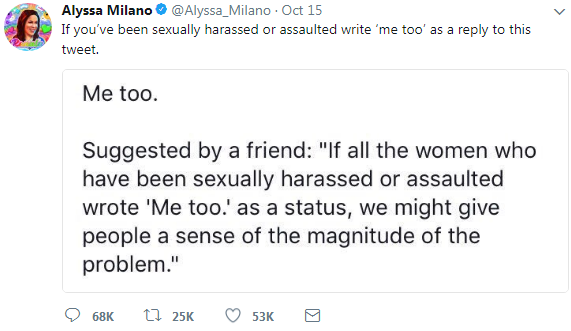 We have seen the words, “Me Too” on our computer screens all week long. In the wake of the most recent sexual harassment reports, actress Alyssa Milano tweeted: “If you’ve been sexually harassed or assaulted, write ‘me too’ as a reply to this tweet. If all the women who have been sexually harassed or assaulted wrote ‘me too’ as a status, we might give people a sense of the magnitude of the problem.”
We have seen the words, “Me Too” on our computer screens all week long. In the wake of the most recent sexual harassment reports, actress Alyssa Milano tweeted: “If you’ve been sexually harassed or assaulted, write ‘me too’ as a reply to this tweet. If all the women who have been sexually harassed or assaulted wrote ‘me too’ as a status, we might give people a sense of the magnitude of the problem.”
Hundreds of thousands of women (correction: now 1.5 million), and some men too, have added their voices, posting, “me too.” Although it is no woman’s responsibility to post about being harassed or assaulted, the wave of “Me Too” responses has been important. It reminds us that sexual harassment and assault are not products of Hollywood celebrity, some unreal world that has nothing to do with us. It’s your neighbor posting, “Me Too.’ Actually, most of your female neighbors. The “Me Too” campaign is giving people a sense of the magnitude of the problem. And that is a tremendous step.
For, studies show that, most people do not speak up when they experience or witness sexual harassment. Why such silence? What are people afraid of? Losing a job? Perhaps. And understandable. But I believe that most of all, women are trying to protect their dignity– to avoid allowing their character to be put on trial.
Where is this fear rooted? In reality. In my formative years, my generation of professional women witnessed the Anita Hill hearings in Oct. 1991. As now-Justice Clarence Thomas was being considered for the United States Supreme Court, Anita Hill shared her experience of his sexual harassment. The all-male, all-white Senate committee, grilled Anita Hill. Senator Arlen Spector (z”l) accused her of being “unfair” to bring such an accusation, and committee chairperson Senator Joe Biden neglected to bring a sexual harassment expert witness, leaving Anita Hill to explain what sexual harassment is! So many of us women watched, praying that we would never find ourselves sitting in the seat she occupied. Not in a Senate hearing, not in a courtroom, not in an HR office. Senator Spector, a friend to women’s reproductive rights in many other seasons, misused his power then. And Senator Biden, now an advocate for women, abdicated his power then.
What does Judaism say? B’tzelem Elohim–we are all created in the image of God (Genesis 1:27). But more specifically, what does Judaism say?
The Talmud tells the story: A man once saw a certain woman, and his heart was so consumed by burning desire for her, that his life was in danger. When the doctors were consulted, and said: ‘His only cure is that she shall submit,’ the sages said: ‘She should not yield; Let him die.’ Then when the doctors said: ‘Let her stand naked before him,’ the sages answered: ‘She should not yield; Let him die.’ When doctors said: ‘Let her converse with him from behind the fence,’ the sages said, ‘She should not yield; Let him die. (Sanhedrin 75a).
Relieved to see the text conclude that: we do not exploit women’s bodies to benefit men’s sexual desires; and to extend beyond the hetero-norms of the Talmud, we do not exploit people’s bodies, the text still reveals the tragic problem we have yet to overcome today: the problem of imbalanced power. Notice: no one asked the woman for her point of view—she had no power. Notice: the man and the doctors, felt they had the right to even propose exploitation—they did have power. When it comes to sexual harassment and sexual assault, the essence is power.
And one of Judaism’s great messages about power, comes to us in this week’s Torah portion.
In the story of Babel, the people endeavor to build a tower with its top in the sky, to make a name for themselves. God sees this and responds: “If…this is how they have begun to act, then nothing they may propose to do, will be out of their reach.” (Genesis 11:1-9).
Nothing out of their reach. Unchecked power.
When God sees unchecked power, God dismantles it.
When we see unchecked power, we must dismantle it.
What can we do with the hundreds of thousands of #MeToo’s? Although men also suffer from sexual harassment and assault and there are also female perpetrators, it is men’s actions and women’s “me too” experiences, that reflect today’s most common power imbalances, and that is where I would like to focus now, in particular, on sexual harassment.
I am grateful that so many people, especially men, have asked: what can we do to help? This is about power, and so we begin by taking steps to balance power. I invite you to join me in these everyday actions that men and women can take:
When a woman tells me she has been harassed, I will believe her.
When I start a conversation with a woman in my office, I will notice how easy it is to default to a comment about her looks. And I will resist that temptation.
If I see one person touch another person who looks uncomfortable with it, I will say something.
If I hear a sexist joke, I will say: That’s not funny and you’re better than that.
If I hear my dentist refer to the hygenists as “the girls,” I will say: please speak about professional adult females in your office, as women.
I will lead with an understanding that no arena is as strong as it should be until different kinds of people are represented–not the boardroom, the Senate, the hospital, the home, the synagogue leadership — so I will pursue diversity in all hiring finalist pools and in professional mentoring pipelines in my field.
Many areas of change will be strengthened by men’s initiative, and I welcome their partnership. So, ways to help, especially if you are a man:
Decline sitting on an all-male panel.
Negotiate for, and take, parental leave.
Identify the settings in which you have power–economic power, social capital… name the ways women might not thrive in those settings, and identify the ways you can include women. (paraphrased from youth minister Lily Dodge’s blog)
Identify your power, use it and share it.
And, please recall with me, exactly 26 years ago, this month. Recall two of the most powerful men in our nation. Imagine if they had had the courage to believe Anita Hill. Imagine if they had had the courage to educate the Senate committee and the nation about sexual harassment. They might have been sacrificing their jobs, their money, their friends, their power, their status, their dignity.
What can we do about sexual harassment today? Imagine the place in your life where you have the most power, the most status, the most to lose. There, you witness sexual harassment. You allow yourself to see it, to believe it. And then you decide, what are you willing to sacrifice? When you see a woman harassed or any vulnerable person harmed by someone in power, someone who can strip you of your power, your money, your friends, your status, your dignity… will you accommodate the predator, or will you allow yourself to notice? Will you keep silent, or will you speak up? Are you ready to make a sacrifice?
Sexism is so deeply embedded in our society that we often accommodate it, unchecked, without realizing. It’s time to realize. And I believe we can. This is a congregation that engages in transformative Torah study, lifting up Jewish values that guide us towards righteousness. This is a congregation that digs deep spiritually, to improve ourselves. This is a congregation that is not afraid of difficult conversations, and the challenging path—the sometimes slow path—to social justice.
Change takes time. Not a single woman who was at Senecca Falls, the Women’s rights convention in 1848, voted in an election. In the Jewish Reform movement, to this day, every arm is led by a male rabbi. But there was a wonderful announcement this week that I am excited to share: one of those arms, our Reform seminary Hebrew Union College, just appointed Rabbi Dr Andrea Weiss as its new provost. Rabbi Weiss, who some of you remember from her teaching here at Rodeph Shalom, will hold the highest leadership position that any woman rabbi has ever held in our movement. Mazel tov to Rabbi Weiss.
God sees the Tower of Babel and responds: “nothing they may propose to do, will be out of their reach.” When God sees unchecked power, God dismantles it.
We will dismantle unchecked power, when we are willing to sacrifice. We will dismantle unchecked power, when we have the courage to use our own power. We will dismantle unchecked power, when we live every day guided by the notion of B’tzelem Elohim, that all humanity is created in the image of God.

